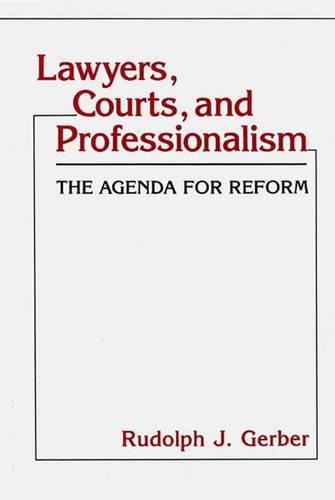
Lawyers, Courts, and Professionalism: The Agenda for Reform
(Hardback)
Publishing Details
Lawyers, Courts, and Professionalism: The Agenda for Reform
By (Author) Rudolph J. Gerber
Bloomsbury Publishing PLC
Praeger Publishers Inc
26th April 1989
United States
Classifications
Tertiary Education
Non Fiction
347.30023
Physical Properties
Hardback
170
Description
Lack of access of the poor and middle class to civil courts, suits that benefit only lawyers, litigation tactics devoted to victory rather than truth or justice, and inefficient courts are some of the issues addressed by Judge Gerber in his outspoken critical appraisal of America's legal profession and judiciary. The author suggests practical--and in some cases radical--remedies needed to make the system responsive to the public and to give substance to the ideal of equal justice for all. Gerber's criticisms of the legal profession today are far-reaching, and the self-reflection in which he asks us to engage is difficult, even uncomfortable. But it is a necessary step in the continuing efforts we all must make to ensure that our profession upholds the highest ideals of professional responsibility. Sandra Day O'Connor, Supreme Court of the United States Lack of access of the poor and middle class to civil courts, suits that benefit only lawyers, litigation tactics devoted to victory rather than truth or justice, and inefficient courts are some of the issues addressed by Judge Gerber in his outspoken critical appraisal of America's legal profession and judiciary. The author suggests practical--and in some cases radical--remedies needed to make the system responsive to the public and to give substance to the ideal of equal justice for all. Following an introductory overview of the troubled condition of our legal system, Judge Gerber considers the narrow process by which future lawyers are selected and the financial motivations that commonly inspire them to study law. He next takes a hard look at legal education, noting that the litigation model now in vogue inculcates a mentality of combat and downgrades peacemaking and negotiating skills. In a discussion of bar exams, Judge Gerber points out that these tests measure neither ethics nor competency and fail to provide for specialty licensing, for which he recommends periodic reexamination and peer review. Commenting on the complexity, confusion, delays, and extortionate costs that prevent equal access to justice, the author offers specific suggestions for streamlining court procedures and revamping the court system by managerial and procedural changes. He examines ethical abuse by courtroom litigators, contending that periodic ethical review and specialized training are needed to insure that justice is served. Concluding with a critical analysis of major competing jurisprudential theories, Judge Gerber argues that a return to natural law ideals is needed to reinspire lawyers and judges with a philosophical sense of the foundations of justice. This important new work is particularly relevant for legal educators and professionals and for courses dealing with the legal profession, legal ethics, the judiciary, and the court system.
Reviews
"Gerber's criticisms of the legal profession today are far-reaching, and the self-reflection in which he asks us to engage is difficult, even uncomfortable. But it is a necessary step in the continuing efforts we all must make to ensure that our profession upholds the highest ideals of professional responsibility."-Sandra Day O'Connor, Associate Justice, Supreme Court of the United States
"The maintenance of a healthy American legal order is ultimately at stake. Perhaps it is not too late to turn the situation around. This book should stimulate heightened interest in these problems and in ideas for dealing with them."-Daniel J. Meador, James Monroe Professor of Law, and Director, Graduate Program for Judges, University of Virginia
As the author of two well-respected books and numerous articles on judicial topics, and as a state appellate court judge, Gerber is highly qualified to prepare this volume on legal and judicial reform. He begins with an overview of the primary problems of the contemporary judicial system and then examines the narrow process by which American attorneys are recruited. Gerber also notes that financial motivation is very high on their list of priorities. He provides a critique of the current state of legal education, bar examinations, and the fact that ethics are given a low priority in the education of attorneys. The author therefore stresses the need for ongoing ethical reviews and specialized training for practicing lawyers. The text is similar to Joseph Grodin's In Pursuit of Justice (CH, Aug'89) and to Views from the Bench (CH, Mar'86) ed. by Mark W. Cannon and David M. O'Brien. Gerber writes well and his provocative arguments are easy to follow. Upper-division undergraduates and above.-Choice
"As the author of two well-respected books and numerous articles on judicial topics, and as a state appellate court judge, Gerber is highly qualified to prepare this volume on legal and judicial reform. He begins with an overview of the primary problems of the contemporary judicial system and then examines the narrow process by which American attorneys are recruited. Gerber also notes that financial motivation is very high on their list of priorities. He provides a critique of the current state of legal education, bar examinations, and the fact that ethics are given a low priority in the education of attorneys. The author therefore stresses the need for ongoing ethical reviews and specialized training for practicing lawyers. The text is similar to Joseph Grodin's In Pursuit of Justice (CH, Aug'89) and to Views from the Bench (CH, Mar'86) ed. by Mark W. Cannon and David M. O'Brien. Gerber writes well and his provocative arguments are easy to follow. Upper-division undergraduates and above."-Choice
Author Bio
Rudolph J. Gerber is a judge for rthe Arizona State Court of Apeals
